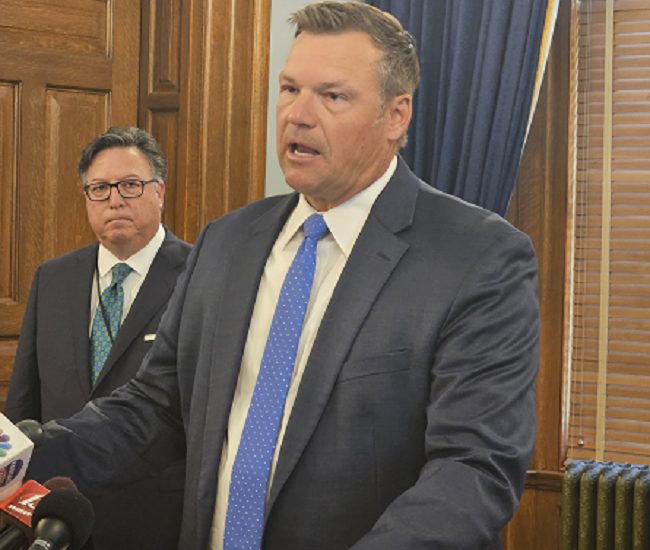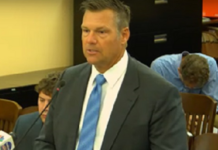(Updated to include response from governor’s spokesperson late Thursday night)
Republican Attorney General Kris Kobach is trying to block Democratic Gov. Laura Kelly from participating in a lawsuit against the Trump administration over what she described as unprecedented and unlawful attempts to cut funding to state government.
Kobach said he filed a friend-of-the court brief in federal court in Massachusetts, arguing that Kelly does not have the authority to bring the lawsuit on behalf of Kansas along with a coalition of attorneys general from Democratic-led states.
The lawsuit, led by New Jersey Attorney General Matthew Platkin, challenges a regulatory clause that the Trump administration has used to justify eliminating grants for public health, counterterrorism, transportation, infrastructure and education.
Kobach is asking a federal judge to dismiss Kelly’s claims in the case because she does not have the authority under state law to bring the litigation.
He said only the attorney general can represent the state in federal court or any appeals court. And in any court, he said, the attorney general decides the state’s position.
“While the governor exercises certain executive functions, she does not control Kansas’s legal affairs, including its litigation in federal court,” Kobach argued in the brief.
“Rather, that authority lies solely with the attorney general…who declined to entangle Kansas as a plaintiff in this litigation — which he believes will ultimately be unsuccessful,” Kobach argues.
Meanwhile, leading lawmakers on the Legislative Coordinating Council on Thursday backed Kobach.
It approved a motion that only the attorney general can represent the state in litigation and that the governor’s attempt to take part in the ongoing lawsuit violates Kansas law.
Senate Minority Leader Dinah Sykes and House Minority Leader Brandon Woodard opposed the motion made by House Speaker Dan Hawkins, a vocal critic of the governor’s as he runs for insurance commissioner in 2026.
The governor’s spokesperson, Olivia Taylor-Puckett, said Kelly brought the lawsuit in her official capacity as governor.
Taylor-Puckett said the Constitution vests the supreme executive power in the governor, who is responsible for enforcing the laws of the state.
“In fulfilling her duty as the supreme executive power in the state of Kansas, Gov. Kelly is standing up against a presidential administration that continues to strip millions of dollars from critical programs that Kansans depend on,” Taylor-Puckett said.
“The attorney general was repeatedly asked to exercise his responsibility to protect the people of Kansas and he refused,” she said.
“Therefore Gov. Kelly exercised her constitutional authority to defend Kansans. She will not allow states’ rights and the best interests of Kansas to be infringed upon.”
Kobach said Kelly is seeking to “usurp” the role of the attorney general by suing on behalf of state.
He said the governor mischaracterizes a dispute over grants as an injury to her constitutional authority as governor.
“The constitutional authority Gov. Kelly invokes — enforcing Kansas’s laws — is not contingent on federal grants,” Kobach argues.
“The Kansas Constitution does not make receipt of temporary disbursements of money from federal agencies an integral component of the state’s governance,” he writes.
“Tellingly, Gov. Kelly cites no Kansas constitutional provisions or statutes that have been, are, or will be rendered wholly unenforceable due to the cancellation of federal grants.
“And without any such citation, she has facially failed to plead an injury to her constitutional office. There is no indication that she cannot enforce state law without relief from this court,” he argues.
Kobach told lawmakers Thursday that the governor asked him to join the lawsuit and make the same claims as the plaintiffs.
Kobach, chair of the Republican Attorneys General Association, said he declined because he doesn’t believe the litigation has merit.
“We believe that the plaintiff states will lose on their claim,” he said.
“Regardless of the relative virtues or necessities of receiving federal funds in any given area,” Kobach said, “the legal claims that the states are making are not winners.”
Kobach said his office isn’t taking a position on the funding cuts.
“We’re taking no position on the cuts,” he said.
“The question of whether it’s legal for the federal government to cut them is separate from whether the cuts are desirable cuts, not desirable cuts,” he told lawmakers.
The lawsuit seeks to limit the Trump administration’s use of a federal regulation to “indiscriminately and illegally terminate” funding for education, medical and scientific research, protecting clean drinking water, and battling violent crime.
“I joined this lawsuit on behalf of Kansas to ensure funds going towards critical programs our state depends on are not ripped away by the Trump Administration — or any presidential administration — on a whim,” Kelly said when joining the lawsuit.
Since Jan. 20, at the direction of President Donald Trump and the Department of Government Efficiency, federal agencies have cut thousands of grants that had been previously awarded to states, the governor’s office said.
In Kansas since Jan. 20, the Trump administration has terminated millions of dollars of federal funding for a wide variety of critical programs.
It has cut $2 million to a Kansas Department of Agriculture program that strengthened the food supply chain by purchasing local, Kansas-grown food and goods for distribution across the state, the governor’s office said.
It has cut Kansas Department of Health and Environment programs in southeast Kansas that enhanced science education in public schools and access to healthy food.
This is not the first time Kobach and Kelly have clashed over litigation.
In May, the governor’s chief counsel talked to the attorney general’s office about getting involved in a lawsuit brought by 23 states challenging the federal government’s authority to eliminate funding for health care and mental health service grants.
But Kobach pushed back against getting involved in the lawsuit even as the governor’s legal team believed it had to power to direct him to join the case.
At that time, Kobach told Kelly that under state law, he had the authority to control the state’s legal position.
He cited two state Supreme Court cases, one indicating that the attorney general had the power to dismiss a case over the governor’s objection and another that found the governor lacked the constitutional authority to intrude on the attorney generals’ duties as an officer of the court.















